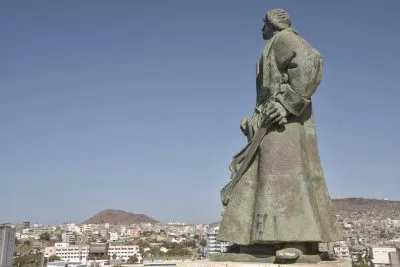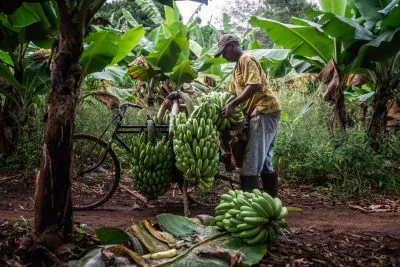In late 1886, waggons loaded with settlers, would-be entrepreneurs and maverick prospectors set course for a rumoured El Dorado in the South African interior. The gold they extracted from the rich seams of the Witwatersrand flooded to the counting houses of Europe, where, processed and polished, it helped to enrich mining magnates to the tune of millions.
The dust and dirt of the South African gold rush provided a crucial lesson for champions of imperial trade – Britain had to urgently develop commercial links with and among its own poorly developed African possessions. “We are landlords of a great estate. It is the duty of the landlord to develop his estate […] improving the property, making communications, making outlets for the product of his land,” argued colonial secretary Joseph Chamberlain.
Ever since that rousing call to trade and development, Britain has striven to maintain a commercial presence in Africa and take full advantage of its historic “estate”. Whether defying the winds of change by ingratiating themselves with the emerging elite of newly independent nations, spurning global opinion by keeping trade alive with apartheid South Africa, or working in tandem with like-minded European partners in a more recent era of superpower rivalry, Britain has adapted to commercial realities and worked to keep the golden goose alive.
According to the Observatory of Economic Complexity, in 2014 the UK exported $15.9bn worth of goods and services to Africa, with some $25.6bn heading in the opposite direction. Yet this year, history threw an unlikely obstacle in the way of those who assumed a perpetual role for British interests on the continent. The UK electorate’s momentous June 23rd decision to leave the European Union – an institution that has governed much of its foreign policy and trading relations with Africa and the wider world in recent decades – has upended all assumptions about the UK’s global role.
Like British decolonisation in Africa, “Brexit” offers engagement on renewed terms or a sustained, possibly permanent, retreat. Yet nothing about the manner of Britain’s EU exit remains clear. Was the vote a howl of isolationist sentiment, a plea on behalf of Brits for their government to retreat to the home front after centuries of global significance? Or was it an ambitious pitch for renewed global relevance by a country too long shackled by an overly bureaucratic Brussels?
“The initial mood was anxiety. The logic of Brexit was seen much more as nativist than alternative solidarity,” says United Nations Conference on Trade and Development (UNCTAD) secretary-general Mukhisa Kituyi, a former Kenyan trade minister. “The fear was that if forces that want Fortress Britain are disengaging from Brussels, it would be difficult to talk about how we benefit more than how we consolidate.”
Yet for UK prime minister Theresa May and other champions of Brexit, the Victorians’ buccaneering push to develop trading relations with nations far and wide offers an irresistible model for modern Britain to follow in the aftermath of the vote.
How Britain overcomes this paradox could settle relations with Africa for decades to come. With the clock ticking down on the two-year withdrawal process after the triggering of Article 50, which Theresa May insists will begin no later than March, Britain is left with a fearsome list of challenges – how to extricate itself from the EU’s trade architecture, re-engage with dozens of African partners at radically different stages of development, and re-energise a moribund trade department that has grown used to subcontracting its work to the European Commission.
“In the short term things are going to be tough,” says Jean-Guy Afrika, principal trade expert at the African Development Bank, speaking in a personal capacity. “I kind of see the ambitions as long-term ones – the road ahead will be long in many respects.”

The Brexit cliff-edge
Reacting to the shock election of Donald Trump – a protectionist US president-in-waiting who has threatened to rip up international trade deals – prime minister Theresa May offered an ambitious vision of Britain as the new and unashamed champion of an open trading system that has reigned since the end of the Cold War. For May, who has taken to Brexit with all the zeal of the convert, Brexit offers an “example of how a free, flexible, ambitious country can step up to a new global role in which … agile nations like Britain can trade freely with others according to what’s in their own best interests and those of their people.”
It was the kind of rallying cry beloved of the arch-Brexiteers who populate her cabinet, but a November trip to New Delhi, India, – where the PM’s early bid for a trade deal met with lukewarm enthusiasm – showed that it will not be plain sailing. As was made clear in India, signing new arrangements with the UK is both undesirable and impossible until Britain’s exit terms from Europe are made clear.
Lord Stephen Green, former chairman of HSBC and an ex-UK trade minister, argues that much will depend on Britain’s success in navigating this transitional period with its African partners. A recent parliamentary advisory report compiled by Lord Green and other experts, which maps out a future for post-Brexit relations with Africa, warns that a cliff-edge scenario – under which the UK leaves the EU but fails to implement transitional arrangements with African countries, leading to tariffs – should be “avoided at all costs.”
“Balancing the need to get a framework deal through with the EU on the one hand and the need to be negotiating trade deals with other countries is going to be a very tricky one. It’s a complex negotiating strategy the government has got to undertake,” he says.
Yet trying to strike arrangements with the 77 nations and territories with whom the EU shares preferential trading agreements is likely to be protracted. And – as Theresa May’s choice of India, rather than Africa, for her first major non-European tour showed – arrangements with the UK’s largest international partners are likely to be prioritised.
This leaves Africa, a diverse continent comprising regional blocs and independent nations at various stages of development, at a distinct disadvantage compared with Europe and Asia, which account for 58% and 23% of UK exports respectively. “One has to be realistic that Africa will not be on the front burner of trade market access negotiations in the short term,” says Kituyi. “While eventually it will be an important player, given limited [UK] resources and negotiating personnel and expertise, other large export markets are going to get a higher priority.”
This fear that Britain simply lacks the institutional capacity to forge transitional deals with multiple African partners – let alone the comprehensive trade deals that underpin the dreams of Brexiteers – is widely shared. A leaked Cabinet Office document, reported in the Guardian in November, suggested that the British government would need to hire an additional 30,000 civil servants to manage a Brexit fallout for which it has “no plan”. The shortage is particularly acute in the area of trade relations. In July, former cabinet office minister Oliver Letwin argued that almost all of the UK’s trade negotiators were working at the European Commission.
“The pressure in terms of expertise the UK will need to mobilise for hundreds of deals is immense,” says the AfDB’s Afrika. “It’s not going to be a 10-person team – the UK is going to need an army of negotiators.” For Lord Green, an immediate priority must be the appointment of an Africa trade envoy capable of working across UK government departments – an energetic facilitator comfortable operating in Whitehall and working alongside African governments at the World Trade Organisation.
Such a person – steeped in experience of the continent – could immediately open transitional discussions with Africa’s regional blocs. Further down the line, the emergence of a Continental Free Trade Area – the African Union’s mooted single market for goods and services which could be gradually phased in from next year – could offer another valuable interlocutor in future trade talks.
“If Africa is able to become a free trade area, this will make it easier for its trading partners to conclude trade deals on a continent-wide basis rather than having to negotiate on a country by country basis,” says Yonov Frederick Agah, a Nigerian deputy director general at the WTO. Until then, Britain may have to prioritise relations with its largest partners on the continent, ensuring that trade relations with South Africa, which exported $6.18bn to the UK in 2014, and Nigeria, which exported $5.21bn, remain unruffled. Kituyi believes that African relations can be upheld through a pragmatic continuation of the status quo.
“If Brexit is to be substantially drawn out I expect that Britain for the interim will want to trade with Africa on the basis of the market access agreements framed when a member of the EU … therefore I see a drawn-out use of the regime working now,” he says.

Opportunity knocks
In October, after a decade of patience-sapping negotiations, the European Union finally began the implementation of a limited trade agreement with the Southern African Development Community. Meanwhile, a similar Economic Partnership Agreement planned for the East African Community remains mired in intense debate in the Tanzanian parliament.
The institutional inertia and sloth-like pace of arranging the EPAs among dozens of EU countries and African counterparties has led many to conclude that Britain and Africa can indeed forge quicker, more nimble accords that better serve the mutual interest.
“The EPAs were a great learning experience for African countries … but we’re hoping that trade deals with Britain will be much more flexible. Many would embrace trade negotiations based on historical trade ties rather than a format proposed to all countries,” says Jean-Guy Afrika.
While the EPAs have been criticised for undermining true regional integration, Britain has gained credit on the continent for the way in which it has linked trade to development and good governance. While some of those provisions were watered down over the course of talks between the 28 members of the European Union, UK-only deals could see them return.
For example, Britain and Africa could bond over mutual distrust of Europe’s controversial Common Agricultural Policy (CAP) – a system of farm subsidies that some argue have long damaged African farmers’ competitiveness and rankled UK taxpayers. Paradoxically, the UK’s reduced voice in Europe could be bad news for African countries who have appreciated its anti-CAP solidarity.
“British expertise and political will have played a critical role in linking trade with development and the fight against poverty … We hope we can see much more development content, and the fight against poverty and issues of governance coming back to trade negotiations between Britain and African countries,” says Kituyi.
Nevertheless, the price exacted by African nations during the EPAs should also caution those who believe that Britain will automatically acquire favourable trading terms. While African countries may welcome the establishment of UK subsidiaries and production facilities that create local jobs, any deal is likely to place significant restrictions on the ability of UK manufacturers to undercut local African producers.
That may disappoint UK exporters wishing to bridge the gap with France and Germany, whose exports to Africa are worth $36.7bn and $28bn respectively.
Besides, not all African countries are in a position to sign reciprocal trade agreements with the UK, especially less economically developed nations whose only existing interaction is through the broadly charitable engagement of the Department for International Development.
Put simply, countries with a tiny manufacturing consumer base and limited economic potential are worth little to a UK trade deal, even as part of a regional bloc. Those countries could also lose out as a result of the UK’s exit from European development funds.
WTO director Agah says that in many cases, the key will be for the UK and its partners to avoid needless haste in order to find the right balance between trade and development. While that may be frustrating for Brexiteers who have staked their careers on inflated promises and instant acclaim, the results of this particular step into the unknown are unlikely to become apparent for many years to come.
“Good practice means taking a medium to longer term view of African development and saying some of these will involve natural evolution which will end with both sides benefiting,” says Lord Green. “Whilst I don’t believe it need take us 10 years, because the advantage we have is negotiating on behalf of one rather than 28 countries – we should not be naïve about how suddenly easy it becomes. ”
David Thomas
Want to continue reading? Subscribe today.
You've read all your free articles for this month! Subscribe now to enjoy full access to our content.
Digital Monthly
£8.00 / month
Receive full unlimited access to our articles, opinions, podcasts and more.
Digital Yearly
£70.00 / year
Our best value offer - save £26 and gain access to all of our digital content for an entire year!

 Sign in with Google
Sign in with Google 





